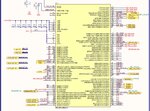jackal183
Newbie level 3

Hi All, i developed a TCP/IP application using the microchip library with the microchip pic24f and enc28j60. The project work many times, but there is a trouble. I am just listening the data from the tcp with a pc program. TCP Keep Alive function of this program have not been used, and the connection continuously and I can do data exchange all times. but i need the tcp keep alive function for my project and i have to add the keep alive funciton in my pc program. the hardware and software with pic24f and enc works all time when the keep alive function is not active. whe the keep alive funciton is active, my connection is lost many times. sometimes 5 minutes, sometimes 30 minutes, sometimes 3 hours, but finally the connection lost. i am listening the all connection history with microsoft network monitoring program. pc program sends the keep alive all times and my hardware sends the keep alive all times too. so why the connection is lost? ahere is the problem. i can't find.


